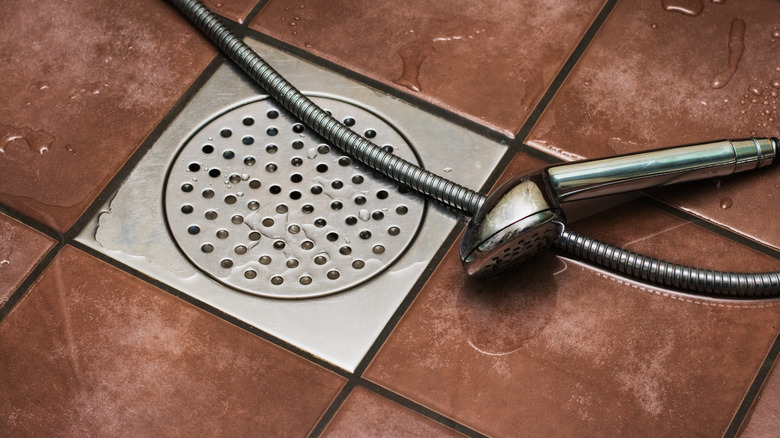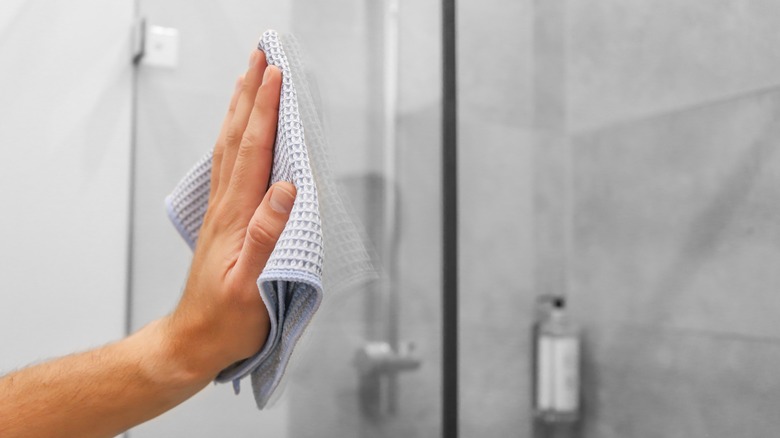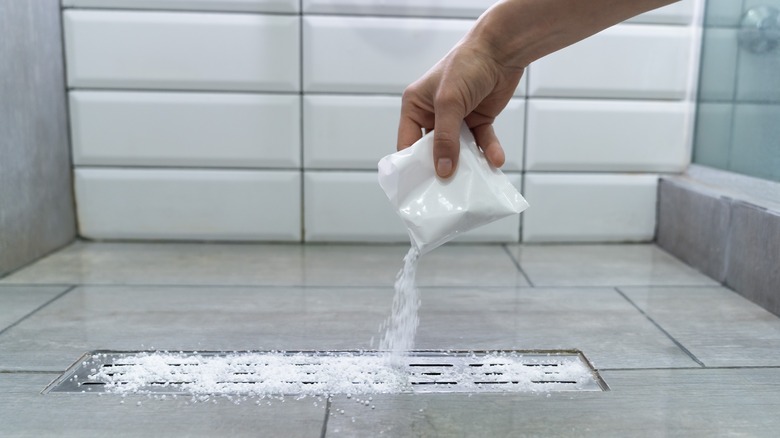Clean Your Shower Drain With A Common Household Essential
We may receive a commission on purchases made from links.
Shower drains face the brunt of our hygiene routine. Although getting clean is an essential part of the human experience, a conglomeration of soapy water, loose hairs, and bacteria run through our shower and down the drain. Over time, a dirty shower drain can lead to a buildup of fungus, mold, and other unpleasant sights and odors. Thankfully, there's a common household item that can clean out your drain and prevent your shower from producing any bacterial buildup: hydrogen peroxide.
Although artificial shower cleaners can keep your bathroom clean, there's nothing quite like a natural remedy that can be found around the house. Hydrogen peroxide is a great antifungal agent that can help prevent and remove any trace of mold or mildew, as well as do away with the chemical fumes often associated with cleaning ingredients. Besides all the brilliant ways we can use hydrogen peroxide in our garden, it can equally benefit our indoor spaces. And while we may not notice the effects of a dirty shower, allowing bacteria to be harbored in our bathroom can be detrimental to our long-term health. With the right concoction of hydrogen peroxide and other natural ingredients, you'll have an inexpensive bathroom cleaner for whenever you need it.
How to clean your shower with hydrogen peroxide
When it comes to cleaning surfaces, hydrogen peroxide is best used as a spray. Using an empty spray bottle, pour half a bottle of hydrogen peroxide. Unlike with certain delicate materials — such as clothes, skin, and polished surfaces — hydrogen peroxide doesn't need to be diluted to be used as a shower cleaner. In fact, you may use hydrogen peroxide the way you would bathroom-cleansing bleach, fortunately avoiding the strong stench while achieving similar results. Once the ingredient is ready for spritzing, it's time to get cleaning.
After spraying the product across the shower floor and walls, allow it to sit for approximately 10 minutes. Once the product has settled, use a wet sponge to begin scrubbing away grime around the floor, drain, and shower walls. For extremely stubborn buildup, apply a second coat of hydrogen peroxide before scrubbing and rinsing off with warm water. Using a screwdriver or pliers, lift the shower drain cover to remove any accumulation of hair, soap, and bacteria that may be stuck inside. Generously spray the hydrogen peroxide and go in with a small brush, scrubbing away at any remaining grime before rinsing the drain off with warm water and closing it shut.
Preventative measures to maintain shower drain
There are a few ways to prevent our shower drains from collecting dirt and beginning to smell, especially if we're keen on using our hydrogen peroxide mix infrequently. For starters, know that hair is one of the most common causes of a clogged drain. It's also the hardest to dissolve using other cleaning agents, which means you're responsible for collecting any hair that falls in the shower. You can achieve this by investing in a shower drain hair catcher, like this one from Amazon. Rather than using your hands or a drain snake to remove clogged hairs, you can solve half the problem with this simple solution.
In addition to maintaining hair fall, other natural ingredients to keep the shower drain clean include vinegar and baking soda. Using ½ cup each of baking soda and vinegar, pour each product individually down the drain. You'll know the concoction is working if it starts to foam, which you can control by placing the drain cap or a small cup above the foaming area. After letting the products steep for approximately 30 minutes, pour a cup of hot water down the drain to finish off the job.
With these natural ingredients at your disposal, your shower drain should be clean in no time.


